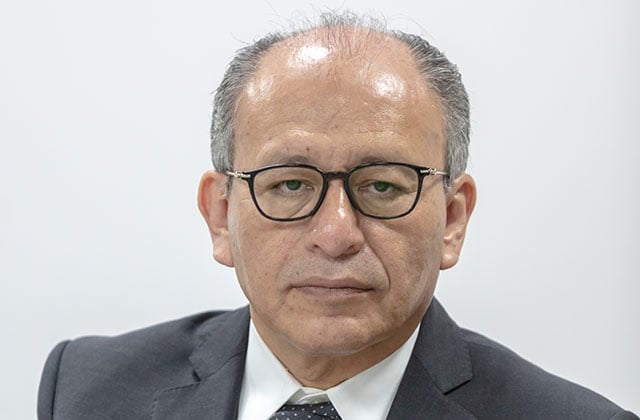- Segments
- Products and solutions
- Products and solutions
- Broadband
- Devices and accessories
- Applications
- Control Rooms
- TETRA and Tetrapol
- Customers
- Ecosystem
- How to buy
- Blog
- EN
“This is, perhaps, the greatest challenge – using technology, the authority can increase trust from the public, conveying the message that the authority is efficient and able to respond whenever needed.”
The state policy is to develop technology, and connectivity in particular, to reduce the time taken to handle information. Likewise, technology also offers security to authorities, preventing intrusions while also allowing them to investigate unauthorized use or the corruption of information.
The end goal, and our intention, is to provide personalized services for both users and citizens in general. That is, communications should be used to coordinate the work of the different entities and agencies to provide security for operators, particularly during high risk operations. At the end of the day, we want to provide personalized services to users from different institutions.
With respect to security and law enforcement, we aim to coordinate the work of the different institutions. From a functional standpoint, operators, or the most frequent users, are police bodies, police organizations, crime investigators and statistical and information analysts. Nonetheless, there is potential for expansion, which might involve operators of law enforcement entities.
We receive approximately three thousand calls per day from citizens to 911. This figure does not take into account internal traffic between entities, because the system has been designed for inter-operability.
Official communication is via radio - the police use radios. We also use mobile phones, provided directly to operators, however, that technology, and the degree of reliability, is provided on a commercial level.
All crime reports at a State level are taken by police officers on site, at the scene, or wherever the victim is. They take notes using a tablet with in-house technology - communication with the Coordination Center is done electronically. These tablets are also used by operators to communicate with each other, in addition to mobile telephone services.
Airbus is currently developing a prototype for us, so that the use of mobile communication services, or mobile phones, can escalate towards these types of devices to guarantee the security of operators, and improve not only the service but confidentiality for the public as a whole.
Security wise, the most important thing is to provide services that depend upon communication systems, while also contributing to a close relationship with citizens and ensuring a quick response from the authority.
Telecommunications are very important to us, because our citizens need to know that the authority is close to them and can provide the required service in the event of an emergency call. They also need to be certain that the call will be answered and that the authority will respond appropriately.
Currently, we are working on several developments to increase the potential of trust in the authority. This is, perhaps, the greatest challenge – using technology, the authority can increase trust from the public, conveying the message that the authority is efficient and able to respond whenever needed.

We have two main challenges. On the one hand, the criminal justice system has the challenge that communications should provide legal certainty, trust in privacy, and promptness in proceedings, in order to make more efficient use of time. On the other hand, with respect to security, the greatest challenge is to provide personalized services that give the public more information, and to be able to do this with technology, as well as to encourage greater participation from the public.
Going back to my earlier example, technology that allows information to be recorded at the scene means that people do not have to go to public offices to file the report. The procedure is legal, all the information is gathered and analyzed by police units, security institutions or crime investigation units from the public attorney’s office. The person who files the report knows that the first step has been taken in getting access to justice, so that the crime doesn’t go unpunished.
This has continuously developed in the two and a half years we have been working with the app and we have seen a 35.5 percent stable increase in the filing of reports. This means that we know more, we have more information on the commitment of crime because people report it more often. And, of course, this knowledge allows institutions to be better prepared to do their job.
We want to work on more developments, more apps, in order to increase that participation from the public. If we can encourage people to participate, if they feel included, then they perceive that they are helping build greater security.
Take a look at the 15 most interesting observations from all the interviewees gathered into a printable document. Get the pdf and print out the quote that most inspires you -
The views and opinions expressed herein are those of the interviewee and do not necessarily reflect the official policy or position of Airbus.
Mr. Granados Torres was born in Santiago de Querétaro, Mexico; he holds a M.Sc. and a Ph.D. in Law from the Autonomous University of Querétaro, where he has taught Criminal Law at the Bachelor’s and M.Sc. programs. Moreover, he has taken part in design, implementation, and coordination activities of the Bachelor’s Degree program on Security Sciences.
He was part of the Judicial Power branch of the State of Queretaro for seventeen years, with a number of positions, from unpaid trainee to trial judge. He was Director of the Judicial Specialization Institute (Instituto de Especialización Judicial), in charge of the design and implementation of the State Judicial Career Service system (Servicio de Carrera Judicial del Estado), for the appointment of public officials.
He was founding member of the Federal Judicial Council of the State. He has also acted as public defender and member of the Public Prosecutor’s Office.
In 1998, he joined the Attorney’s General Office of the State as Criminal Investigation Director, and was Attorney General from 2002 to 2009.
Mr. Granados Torres has also been a consultant, advisor and legal representative in various areas of the public administration, security and justice arena. He has also been guest professor at INACIPE and other educational institutions across the country.
From October 2015 to date he has been Secretary of Government, appointed by Governor Francisco Domínguez Servién, as head of the Security Cabinet and General Coordinator of the Querétaro Model for the Oral Justice System.

Juan Martin Granados, Secretary of Government, State of Querétaro